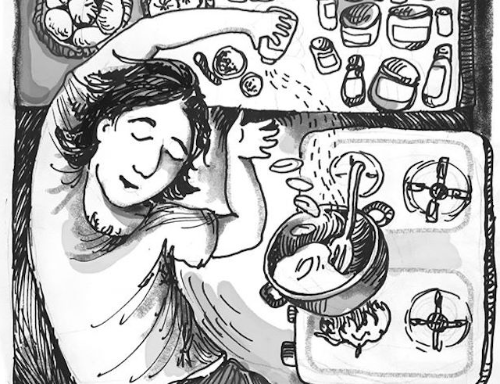Defensive Finance in a Downturn

I live in the bay area of the United States in a suburb of San Francisco. At the time of writing, I’ve been in isolation from the world for roughly 3 weeks, with no clear end in sight.
And while the stock market is currently doing unusually well, there’s no question in my mind that the coronavirus pandemic is going to cause a lot of financial hardship for just about everyone over these next few years.
Millions of Americans have already lost their jobs, many businesses have already closed for good, and there’s a pretty decent chance this pandemic will take a while to resolve, even in optimistic scenarios.
If you haven’t done so already, now is the time to put together a defensive plan for your personal finances. It’s important to take stock of your existing situation, your prospects, and develop some logic-driven plans for what you’re going to do now and in the future to ensure you come out the other side of this downturn in as strong a position as possible.
With that said, I’ll walk you through how I think about defensive finance and what I’m doing with my money to weather the storm.
Are You Playing Defense or Offense?

In American life, most people play offense. They focus their time, energy, and effort on acquiring money and do little to “defend” their money by reducing expenditures, paying down debts, etc.
I know a lot of talented techies who earn upwards of 200k a year and still live paycheck to paycheck. It isn’t as uncommon as you’d think. People who manage their personal finances in an offensive way tend to spend what they earn (and sometimes more).
When they get a raise they use it to move up in lifestyle instead of pay down debts. When they get a bonus it goes towards nice vacations, home improvements, or gifts.
There’s nothing inherently wrong about playing offense with your money, but it does introduce a substantial amount of risk into your life. If you lose your job, are forced to take a pay cut, or need cash for unexpected expenses it can be dangerous to have large monthly payments.
If you suddenly find yourself going from making 200k a year to 100k a year, but still have 10k in monthly commitments, you’re going to have to make some tough decisions.
On the other end of the spectrum, you have defensive players like myself. People who are wary of monthly payments and instead try to pay down their debt as fast as possible, reduce liabilities, and generally live a less-risky lifestyle.
Defensive people tend to live more frugally, keep a substantial amount of cash on hand as a buffer against the unexpected, and are generally more conservative with their resources.
And while the best time to put together a defensive personal finance strategy is when you’re in a strong financial position, it’s never too late to start playing defense, de-risk your life, and strengthen your financial foundation.
Since we’re in the middle of a worldwide crisis at the moment, there’s never been a better time to get a grasp over your finances and start making changes that will allow you to prosper regardless of what’s going on in the world.
Take Stock of Your Finances

The first step in building a financial plan is to take stock of where you’re currently at. You can’t make good financial decisions if you have no idea what your overall financial situation is.
If you’re making 50k per year and are 50k in debt, your plan is going to look a hell of a lot different than someone who’s making 50k per year and has no debt, for example.
If you aren’t already tracking how much money you’re spending and saving, the first thing I’d recommend you do is create a free account on either mint or Personal Capital. Both of these free services let you hook up your bank accounts, credit card accounts, investment accounts, loan accounts, etc., so you can track how much money you have coming in and out, what you’re spending, and what your net worth is.
Once you’ve got all your data synced, the next thing you’ll want to do is look back over the last 30 days or so of expenses and write down:
- How much money you have coming in every month
- How much money you have going out every month
These two numbers are important to know: how much you’re making and how much you’re spending. You should always know what these numbers are. Your goal should be to always spend less than you make. If you notice yourself spending more than you make in a month, warning shots should be going off in your head.
NOTE: I recommend logging into your finance tracking app once every week and checking to see how much you’ve spent. It’s a great way to stay conscious of your spending habits and allows you to be more thoughtful with your resources. I’ve noticed that when I don’t do this, I end up spending money without even realizing it.
The next thing you’ll need to do is look through every purchase you’ve made in the last 30 days and categorize them.
- Essential expenses. These are things you absolutely cannot live without. This includes things like grocery bills, electricity and gas, and rent/mortgage payments.
- Obligations. These are outstanding debts that you are obligated to make payments on. These could be things like credit card minimum payments, student loan payments, car payments, etc.
- Luxury expenses. These are essentially everything else: Netflix, fast food, electronics, internet, video games, etc.
Once you’ve categorized your expenses into the three categories above, tally them up. This will give you some useful information, namely:
- How much money do you need coming in every month to survive? This is your “survival” burn rate. This is the minimum amount of money you need to make every month to stay alive.
- How much money do you need to stay current? This is the amount of money you need to not only survive but also pay the minimum on all your debts, loans, etc. While it is possible to not pay these things in a pinch, this isn’t something you want to do if you can avoid it.
- How much money do you need to keep up your current lifestyle? This is the amount of money you need to keep living like you are now.
I’ve been tracking my finances this way for many years now. Always knowing your various burn rates is incredibly useful. It gives me a good idea of what I need to earn and helps me put things in perspective.
My wife and I, for example, could live off as little as ~1.5k per month if we had to. It wouldn’t be a great lifestyle, but we could make it work. Even if your number is large, knowing what you need to earn to survive is essential when designing a defensive finance plan.
Build an Emergency Fund

Once you’ve figured out where your finances are at you need to build an emergency fund. This is a pile of money that should cover your expenses for no less than 6 months. For example, if you are currently spending 5k per month, your emergency fund should be no less than 30k.
The idea here is that if you lose all your income, you should be able to survive like you are currently for 6 months: enough time to find a new job, reduce your expenditures, etc.
If you already have money set aside to cover at least 6 months of expenses: congratulations, you’re in a great spot! Don’t have a 6-month emergency fund yet? Don’t panic. There’s no better time than right now to get started. Having an emergency fund is absolutely essential, especially in times of economic uncertainty.
If you’re worried you might lose a job or have to take a pay cut, your number one goal should be to cut your expenses as much as possible in the short term and start piling up cash so in the event something bad happens you’ll have some wiggle room.
Let’s say, for example, you make 60k per year (after-tax) and spend 36k. This means that each month you bring home 5k and spend 3k. In this scenario, your emergency fund should be at least 18k (3 * 6). If you’re able to save 2k per month out of your 5k salary, that means that it will take you ~9 months to build up that emergency fund from zero.
This is why it’s so critical you get started right away. Saving that much money can take a while, but it’s absolutely worth it. Having a 6-month buffer can mean the difference between incurring a massive amount of debt or being mostly unaffected in the event of a job loss, medical expense, etc. Having the ability to survive for 6 months without work is incredibly empowering.
NOTE: You should never invest your emergency fund. It should be kept in a high-yield savings account you can access easily if necessary. Putting your emergency fund into investments like stock, bonds, etc., is a risky proposition because if the value of that investment drops, you now have less of a buffer if you need it.
For the last few years, my wife and I have maintained a 1-year emergency fund. This is a very conservative amount but lets us sleep well at night knowing we don’t have to worry about job loss, economic instability, etc.
Recently, with the virus pandemic causing so much uncertainty, my wife and I decided to double our personal emergency fund. We’ve now got a 2-year emergency fund sitting around, which lets us continue to sleep well at night knowing that even if this pandemic causes massive economic turmoil, we’ll be OK.
If saving up a year (or two years) worth of expenses sounds daunting to you, just keep in mind that the less you need to live, the faster you can save. For example, if you earn 50k per year and spend 40k per year, saving a 1-year emergency fund is going to take a long time. But if you make 100k a year and still only spend 40k, you’ll be able to save a 1-year emergency fund substantially faster.
Reduce Lifestyle Expenses

Regardless of whether you’ve got an emergency fund or not, the next thing you’ll want to do as part of your defensive financial plan is reduce lifestyle expenses.
Go through all the non-essential expenses you’ve made in the last month or so and figure out where you can safely cut back. For example, if you were paying $500 a month for an expensive gym membership that you can no longer use during the coronavirus pandemic, now would be a good time to cancel or temporarily pause that membership.
If you have subscriptions to Netflix, Hulu, Amazon Prime Video, and HBO, why not pick your favorite service and cancel the rest? In a downturn, flexibility is key. By reducing your expenses you are giving yourself the most possible options later on.
If you can trim a few hundred dollars a month off your existing expenses, that means you can build your emergency fund that much quicker, or invest that much more money during a downturn when the price of investments is lower.
At this point in time, my wife and I have cut back substantially on our non-essential spending. We’ve canceled all travel expenditures, almost all of our restaurant spending, and the majority of our shopping expenditures. This month we’ll likely spend around 1.5k less than usual, which is a fair amount of money for us.
Reduce Liabilities

Now that you’ve cut your non-essential expenses down as much as you can without adding too much pain to your life, it’s time to reduce your liabilities.
If you have a mortgage payment, car payments, student loan payments, credit card payments, etc., those are all considered liabilities. Having to make payments to someone else puts you in a vulnerable position for a few reasons:
- It increases your monthly burn rate, meaning you need to save a much larger emergency fund to accommodate your payments
- It reduces the amount of money you can save per month
- In increases your risk. If you lose your job or are only able to earn a fraction of what you are earning today, having to make debt payments will increase your stress, decrease your flexibility, and put you more at risk of needing to take extreme measures to stay afloat.
If you’ve got an emergency fund ready to go and are still working and able to save money each month, you should start pouring all your extra money into paying down your smallest debts first (this is called the debt snowball method).
The reason I believe paying down the smallest debt first is a good idea (especially in an economic downturn where nothing is certain) is that by paying off your smallest debts first you’ll be able to reduce your monthly minimum payments, thereby buying you additional flexibility if you need it.
For example, if you have:
- A mortgage loan for 100k at 4% interest
- A student loan for 10k at 7% interest
- Credit card debt of 5k at 15% interest
- A personal loan of 10k at 20% interest
Even though mathematically it would make the most sense to pay down your highest interest loan first (the personal loan at 20% interest), if you can quickly pay off the 5k worth of credit card debt first you’ll free up a few hundred dollars a month, thereby reducing your burn rate and making your emergency fund more effective.
Again, flexibility is key here. Paying off debt and reducing the amount of money you need to pay other people will give you more options in tough economic circumstances.
I’ve written about this before, but my wife and I have no debt. We made the decision a while back to eliminate all the debt in our life while we were able to in order to ensure we’d be OK in the event of a major financial crisis.
The thought of needing to make large mortgage payments, car payments, etc., stresses me out. If you can avoid debt or are able to pay yours down, I strongly recommend it. The peace of mind it brings is absolutely worth the struggle and sacrifice it takes to pay it off.
Keep Earning Income

Once you’ve reduced spending and started an emergency fund it’s time to focus on staying employed.
In a financial downturn like the one we’re currently experiencing, employment is not guaranteed. Companies are shutting down and layoffs are coming.
Probably the single most important thing you can do in a downturn is to keep earning income. As long as you are able to keep money coming in, you’ll be ok.
Here are some of my suggestions to keep earning money even in terrible economic conditions.
First off, work hard. There’s no substitute for hard work. If you work hard and do the best job you can, your employer will recognize that. In the event they do need to lay people off, you’ll be at the bottom of the list.
Next, be essential. Every company has essential people. Similar to working hard, being so great that you’re an essential part of the business provides some level of job stability. If you’re a core developer helping to keep the business running, for example, you’re going to have far more job stability than someone working on a new, experimental project that doesn’t generate revenue.
Even if you’re in a role that isn’t core to the business, there are many ways to make yourself essential: show value, understand the business and how you contribute and push for positive change to help improve the bottom line when possible.
Pick up extra shifts/side work/freelance jobs. If you’re in a position where you can legally and reasonably do additional work to make extra money, now’s the time to get started. Diversifying your dependence on a primary job and making a little extra money can be a great way to reduce risk.
If you get laid off and have no other prospects, finding work in a job market where you have a massive amount of competition with other job seekers can be difficult. But… If you get laid off and already have some side work/freelancing jobs/etc., you’ll at least have some money coming in to help offset your expenses.
And, if you do get laid off, update your resume and start applying for jobs right away. Unemployment is at the highest level in the US right now since the great depression. That means there are millions of other people looking for work right now. If you get laid off, start looking for something new immediately. Don’t wait. The faster you get back into the workforce, the less you need to worry. But whatever you do, don’t wait.
Again, the key is to keep working. If you do get laid off and aren’t able to find a similar job quickly, don’t wait around forever – find work doing something so you can keep bringing in money to stabilize yourself. Having a little money coming in is a lot better than having no money coming in.
Take Advantage Of Opportunities

If you’ve already done everything else we’ve discussed above, you’re in an ideal situation. You have an emergency fund, no debt, and you’re spending less than you make. This puts you in rare company.
If you’re at this point, part of your defensive personal finance strategy should be to take advantage of opportunities as they arise. There are many ways to do this, here are just a few:
- Start a company that serves a clear and present need. Right now, for example, there are tons of distilleries around the country who’ve shifted from manufacturing spirits to hand sanitizer. There are always opportunities in financial downturns, so keep your eyes open for ones that make sense.
- Invest in the markets. There’s no better time to invest in the market than during a downturn because you’re purchasing assets at a discount. Buy stock regularly and hold onto it. When the markets eventually bounce back, you’ll get a great return.
- Look for asset acquisition opportunities. Outside of the markets, there are many other types of assets you can purchase: rental properties, small businesses, etc. In financial downturns, it isn’t uncommon for property owners to sell properties at a discount (if they need money now), and the same is true for businesses.
What Sami and I are doing today is the following:
- We’re investing 50% of our monthly savings into index funds
- We’re taking the other 50% and stockpiling it as we look for opportunities
Right now, we’re looking to purchase rental properties (if the prices drop, which I suspect they will) as well as potentially a franchise business. Due to the forced closure of so many companies, there are already lots of businesses being put up for sale at steep discounts.
I’m currently conducting due diligence on a few potential opportunities which I’m hoping will work out.
The main thing to keep in mind is that there are always opportunities. By having a sufficient emergency fund, no debt, and spending less than you make, you’re putting yourself in a strong situation where you can take advantage of the opportunities you come across.
Go on the Defensive

During a downturn, you need to start playing better defense. Reduce your spending, have a reasonable cash buffer so you can weather short bouts of unemployment, pay down your debts, focus on staying employed, and look for good opportunities.
The current coronavirus pandemic is causing pain for everyone: job losses, economic turmoil, sickness, and death–but by being conscious of your spending and building a defensive plan, you’ll be able to pull through in even the most difficult times.
It doesn’t matter where you’re at now, it only matters where you’re going. Stay healthy and hang in there.
PS: If you read this far, you might want to follow me on Bluesky or GitHub and subscribe via RSS or email below (I'll email you new articles when I publish them).